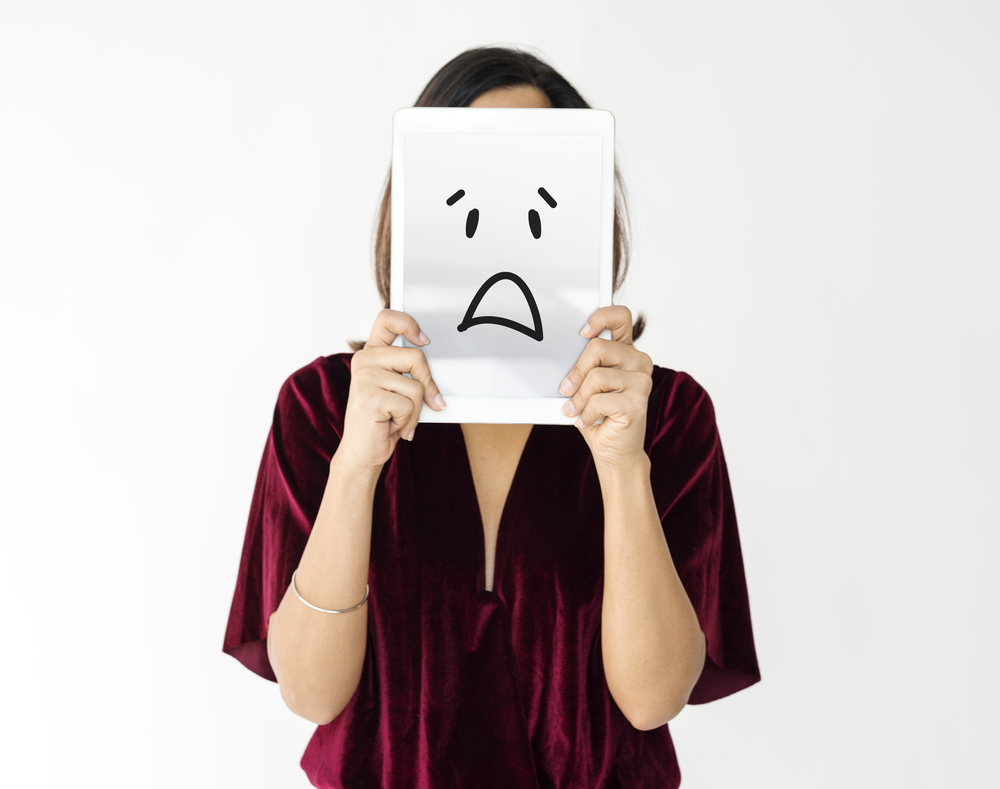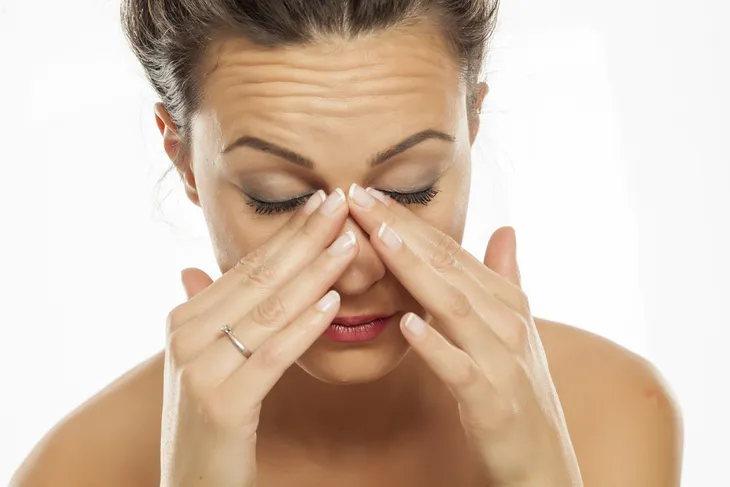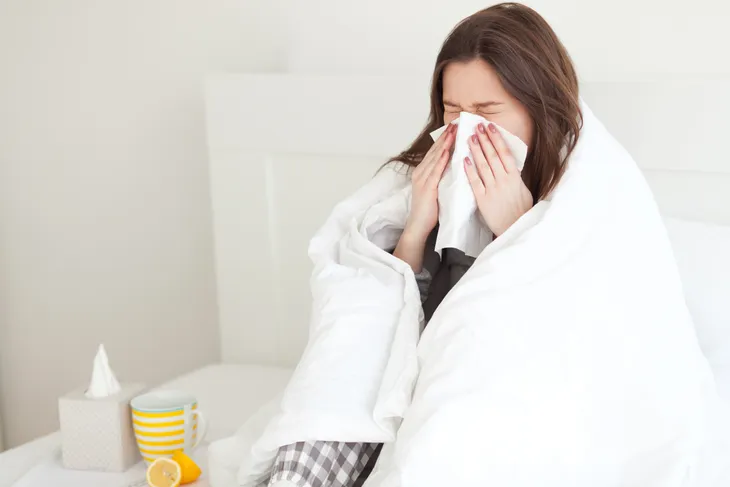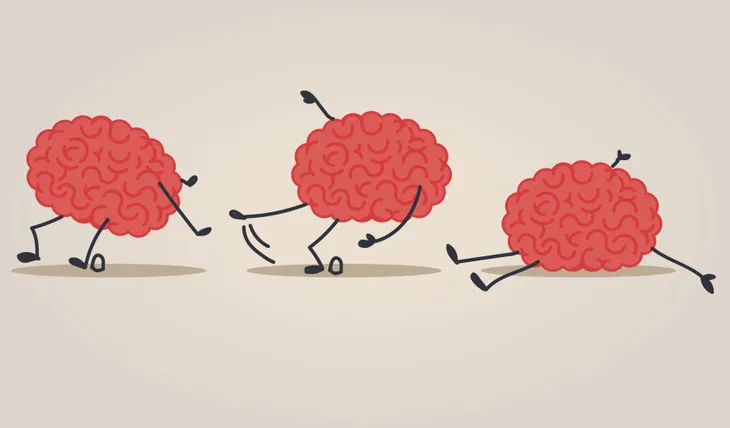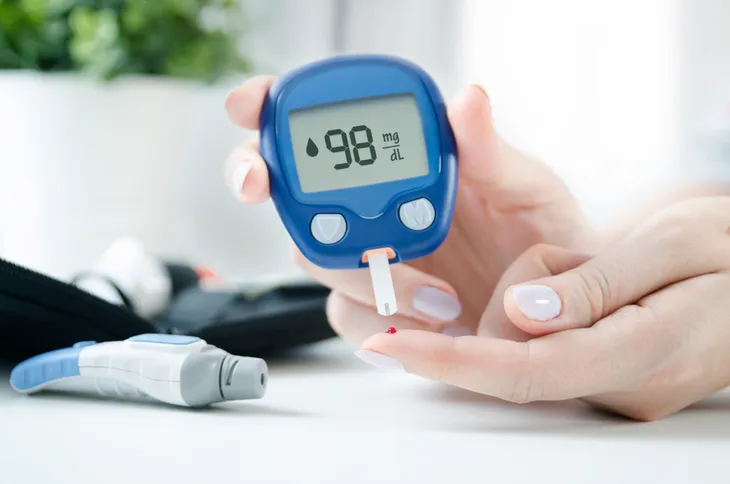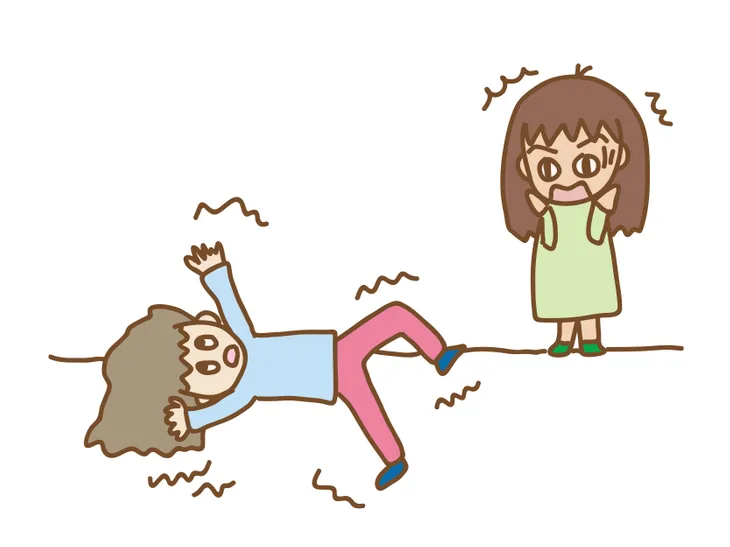We all deal with stress from time to time, some more than others. It can happen at work, during school, or anytime we get overwhelmed, anxious, or just too busy. For the most part, stress is manageable and once it passes we go back to normal. However, there are times where it can be a bit more debilitating, particularly if the stress is recurring or chronic, or when it sneaks up on us bringing along some strange and unusual physical symptoms.
Stress and anxiety can be seen in many different parts of the body, anywhere from headaches to hair loss, and even digestive problems. Being able to identify how the stress is affecting your physical health might help identify the problem. Here’s a look at some of the most common ways stress can affect our physical health…
Headaches
For many people, times of stress mean frequent headaches. Experts find that stress often leads to tension headaches, which are caused when muscles in the upper back and neck tense up. The end result can be contracting scalp muscles and painful headaches.
Consistent anxiety can also lead to painful migraine headaches, which are tough to get rid of and can last for hours, even days. To reduce tension headaches, doctors encourage patients to be more active or engage in relaxing activities, such as getting a massage or taking a warm bath. (Here are some more Reasons Behind Your Headache).
Eyelid Twitching
A twitching eyelid is super annoying. Anyone that has experienced this will testify to that! You also think that everyone else can see it twitching which makes it even more uncomfortable. According to Women’s Health, eyelid twitching is usually caused by stress, but experts aren’t really sure why.
The best way to combat a twitching eyelid is to try and relax. Close your eyes and take a deep breath. “Inhale for four seconds, hold your breath for seven seconds, then exhale for eight seconds,” suggests Women’s Health. “Repeat this four times while using a fingertip to put mild pressure on the lid that’s twitching.”
If that doesn’t work, there are some over-the-counter medications that can help. The source talked to Anne Sumers, MD, of the American Academy of Ophthalmology who says artificial tears may also help ease the spasms. If the twitching spreads to other areas in the eye, go see a doctor.
Depression
Constantly dealing with stress can lead one to feel angry, depressed, even hopeless. Over time, stress can cause a person to feel like they’re trapped, leaving them unable to make decisions, and worried about all matters, both professional or personal. Eventually, stress can lead to feeling burnt out which will only exacerbate the problem.
To counteract the way stress affects your mood, engage in activities that help you forget the source of stress, such as physical activity or meditation. Try activities that keep your mind occupied for an extended period of time.
Back Pain
Yet again, this symptom is caused by those fight or flight hormones that the body pumps out during stressful situations. In addition to raising blood pressure and heart rate, stress can tense up our muscles which causes pain. This type of pain can be common in people who work at a desk. If they are stressed, they tend to lean forward closer to their work while hunching over their desk.
The best way to treat back pain that is caused by stress is to move around more. If you’re someone who works at a desk and suffers from back pain, try getting up from your desk and walking around once every hour. Women’s Health suggests doing simple exercises like, raise your hands over your head, touch your toes, and then roll the neck and shoulders. Even better, take a 10 to 15 minute walk around the office once or twice a day.
Weight and Metabolism
Stress and weight problems often go hand in hand. That’s because feeling stressed, anxious and depressed can cause one to search for relief in food and that often means “comfort” or unhealthy foods that are high in sugar, fat and calories.
Additionally, stress can have a detrimental effect on metabolism. Specifically, it can cause our bodies to store more fat, only exacerbating feelings of anxiety. Staying active can help the problem by keeping you occupied, burning calories and restoring confidence.
Inflammation
Inflammation is typically a sign that the body is trying to fight something off and it’s no different for stress. Everyday Health refers to a study published in Frontiers in Human Neuroscience journal which found that chronic stress can lead to increased inflammation in the body. This might be due to the fact that chronic stress increases the body’s production of proinflammatory cytokines, which are a type of immune cell used to defend the body during an infection.
“One of the proposed actions of stress is that it triggers inflammation in the body, which is thought to underlie many diseases, including heart disease, diabetes, autoimmune disorders like multiple sclerosis, and even pain,” says Alka Gupta, MD, co director of the Integrative Health and Wellbeing program at NewYork-Presbyterian/Weill-Cornell Medical Center in New York City when talking to Everyday Health.
The source also talked to Michelle Dossett, MD, PhD, an assistant professor at Harvard Medical School and a staff physician at the Benson-Henry Institute for Mind Body Medicine at Massachusetts General Hospital in Boston who explains that people with autoimmune conditions have higher levels of proinflammatory cytokines. Luckily, people are able to lower the amount of cytokines in the body and thus decrease inflammation by reducing and managing stress with techniques like meditation.
Blood Pressure Problems
Those who experience stress for prolonged periods of time may find themselves facing significant health problems like high blood pressure. That’s because stress hormones can increase the activity of the heart and, over time, this can lead to constricted arteries.
If left untreated, high blood pressure can lead to heart attack and stroke, both of which can be fatal. If you start to experience consistent chest pain, talk to a doctor immediately and search for ways to begin reducing your stress.
Hair Loss
Hair loss is often associated with middle aged men, but it can actually occur in women as well. According to WebMD, hair loss can be the result of consistent and intense stress and can affect anyone at any stage of life. And, because of society’s never-ending love affair with hair and its appearance, hair loss typically heightens stress levels, resulting in a vicious cycle of stress leading to hair loss, which causes more stress, which leads to more hair loss.
The good news is that there are ways to restore hair. The first step, of course, is identifying the source of stress and dealing with it. Your doctor can help with this and may know of treatments that can help encourage hair growth.
Acne
For most people, our skin is actually quite sensitive, just like our hair. Any change in the levels of androgens in the body can cause our skin to breakout, says Roberta Sengelmann, M.D., a dermatologist in Santa Barbara, California when talking to Women’s Health.
SELF also notes that surges in the stress hormone, cortisol can lead to cystic acne. This type of acne can be quite painful and does not go away easily on its own. If you’re someone who suffers from acne due to stress, go see a dermatologist. Women’s Health warns that recurring acne causes chronic inflammation which can lead to scarring. (FYI: resist the urge to touch any of them because this just leads to further inflammation).
You can most likely treat this acne with a topical prescription medication or certain soaps. “Your dermatologist might also suggest you go on birth control, or switch up what you’re already on to balance out your hormones,” writes Women’s Health. “And be sure to stick to non comedogenic (i.e., non-pore-clogging) makeup, moisturizer, and sunscreen.”
Lowered Immunity
Being under stress for an extended period of time can weaken the immune system and make you more vulnerable to ailments, from minor conditions like a head cold to more serious issues, like influenza. These conditions can make it more difficult to keep up with the demands of daily life, from going to work to looking after children.
To help counteract the effects of stress, get quality sleep, follow a healthy diet—consisting of lots of fruits, vegetables, lean protein and whole grains—and exercise regularly. If you find yourself frequently falling ill, talk to your doctor to see how you can address the source of stress or any other health matter that could be causing you to feel sick.
Stomach Ache
Chronic stress will lead to pain and irritability in the stomach, intestines and other parts of the gastrointestinal system. This type of discomfort can make eating, sleeping, working, or exercising difficult, and even impossible to do.
Stomach pain accompanies stress because when we feel anxious and stressed out, our body releases adrenaline and hormones that can drive blood away from our gastrointestinal system and towards other parts of the body. This can have the effect of impeding effective digestion, leading to pain and discomfort. In this case, medications designed to treat stomach issues may not have much effect in easing symptoms. Talk to your doctor about finding a way to alleviate stomach pain by addressing the source of stress.
Insomnia
We’ve all been there—feeling stressed due to personal relationships or work which causes us to lay awake in our beds at night, unable to fall asleep. It can be one of the most frustrating experiences and, for some people, it can take place every night. (Check out this list of Reasons You’re Suffering From Insomnia).
Stress often makes it difficult to get a good night’s sleep because it causes the mind to continue working when it should be shutting down. Unfortunately, that can only intensify our stress and make it even tougher to relax and fall asleep. While medications can help with this, they’re hardly a long-term solution. Your physician can help you find relaxation techniques that can make it easier to get rest naturally.
Lowered Libido
When stress spikes, sex drive often suffers. That’s because stress can have a direct impact on hormone levels, making it very difficult for a man or woman to become sexually aroused. In effect, feeling overwhelmed and anxious about life causes our brains to prioritize and that leaves little room for reproduction.
Relaxation techniques and physical exercise can help counteract the effects of stress. So too can activities that give you joy and help restore feelings of satisfaction, happiness and confidence.
Jaw Pain
Ever catch yourself clenching your teeth when caught in a stressful situation? You’re not alone. Stress often causes people to clench their jaw, and gnash and grind their teeth and, if done frequently enough, this can lead to gum recession, fractured teeth and lots of pain.
For some, the matter can have long-term effects on the jaw and teeth. If this is the case, a doctor may prescribe a mouth guard to be used at night. Typically, the mouth guard only needs to be worn temporarily, but they may also be required when working, playing sports or driving—in other words, during activities that can heighten stress levels.
Changes to the Brain
Do you struggle with thinking clearly during stressful situations? Some people thrive in stressful situations while others get completely overwhelmed. There’s a reason our brains become muddled when we’re stressed or just not as sharp as if we were able to take our time and be at ease. This is because stress changes how the brain processes information.
“We see actual structural, functional, and connectivity-related brain changes in people who are under chronic stress,” explains Alka Gupta, MD, when talking to Everyday Health. The biggest effect on the brain is in cognition and attention, this is why it’s hard to learn new things when stressed or under stress.
The changes are even more significant in people who are chronically stressed or suffer with post-traumatic stress disorder. “Brain scans of people with post-traumatic stress disorder show more activity in the amygdala, a brain region associated with fear and emotion,” says Jennifer Haythe, MD, a cardiologist and co-director of the Center for Women’s Cardiovascular Health at NewYork-Presbyterian/Columbia University Irving Medical Center in New York City to the source.
Irregular Period
This one obviously only pertains to women, but when there’s too much cortisol (the stress hormone) released in the body, it can interfere with other hormones that control and regulate ovulation. This causes a woman’s period to become irregular. “Extreme stress may stop your body from releasing an egg (it’s called anovulation), which means you won’t get your monthly visitor,” writes SELF.
Many women struggle with irregular periods and it’s not always due to stress. The source notes that the kind of stress that can mess with a woman’s period is extreme, chronic stress, not the kind that most people don’t encounter on a daily basis.
Pregnancy Complications and Infertility
There’s a reason people never want to put a pregnant woman in a stressful situation — it’s because it can be harmful to her child. Now that being said, the normal everyday stresses that the average person comes across are generally not harmful to any pregnancy, but severe stress like losing a job or going through a divorce, can increase a woman’s chance of going into premature labor, says Health.com.
On the other hand, stress can also decrease a woman’s chances of getting pregnant in the first place. “One study found that women with the highest levels of stress-related substance called alpha-amylase were about 12-percent less likely to get pregnant each cycle than those with the lowest concentrations,” writes the source.
Raise Blood Sugar
Just like stress can raise our blood pressure, it can also raise our blood sugar levels too. Health.com notes that this might be more prominent in people with type 2 diabetes. Raised blood sugar levels can be combated by changing up your diet, exercising more, and adjusting medication.
Health.com refers to one study in particular of “obese black women without diabetes found that those who produced more stress-related epinephrine when asked to recall stressful life events had higher fasting glucose and bigger blood sugar spikes than those with lower epinephrine,” writes Health.com. This suggests that stress can raise blood sugar levels in people without diabetes, too.
Seizures
This one isn’t common, but according to research at the John Hopkins Hospital, people who are sensitive to stress are more likely to experience seizure-like symptoms like staring off into the far distance or even convulsions.
“Up to one-third of people treated for seizures at the hospital didn’t respond to standard anti-seizure medication and doctors concluded that they had stress-induced symptoms,” writes Health.com. This condition is known as conversion disorder. It can cause people to “subconsciously express emotional trauma as physical symptoms.”
Premature Aging
None of us want to age any faster than what nature intends. To avoid any premature aging, Health.com suggests maintaining low stress levels as much as possible, or developing tools and techniques to help better deal with any stress.
People who have suffered through traumatic events are more likely to age faster. This is because chronic stress, “can shorten telomeres, the protective caps on the ends of cell chromosomes, causing your cells to age faster.” The best way to combat this is with exercise. The source notes that exercising even just three times a week could help combat and counteract the effect.
